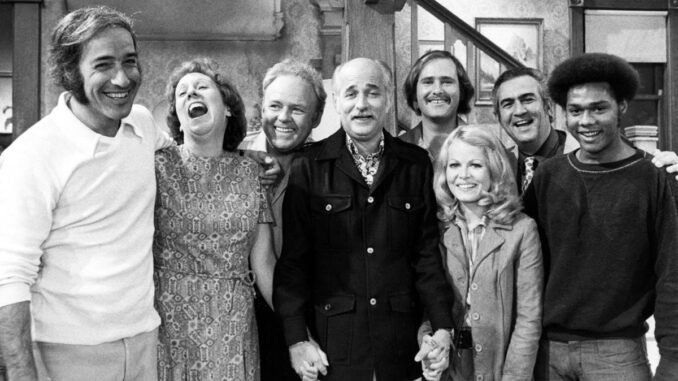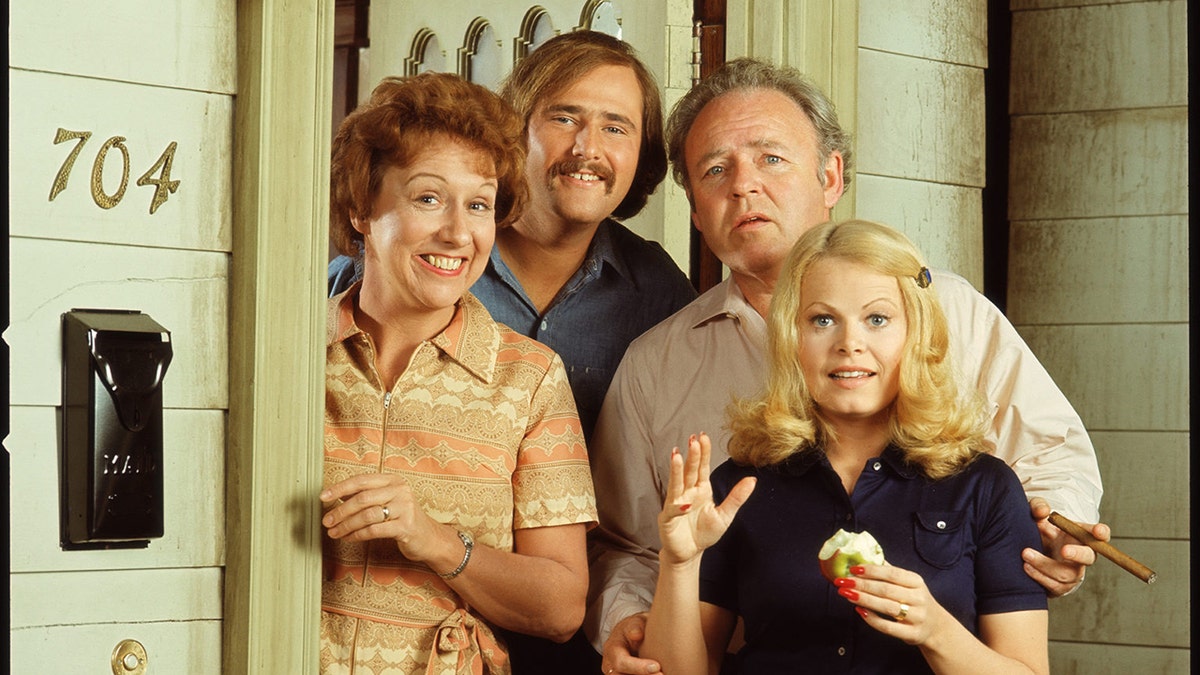
All In The Family And Its 7 Spin-offs, In Chronological Order
When All In The Family premiered in 1971, few could have predicted that it would go on to not only change the landscape of American television but also give birth to a series of beloved spin-offs. Created by Norman Lear, the sitcom was groundbreaking for its portrayal of social issues and its bold, often controversial humor. The show ran for nine seasons and became a cultural touchstone, influencing both TV and the wider social landscape.
However, what many don’t realize is that All In The Family didn’t just stand on its own; it sparked a string of successful spin-offs, each of which carved its own niche in the world of television. These spin-offs expanded on characters and themes introduced in All In The Family and turned them into beloved stand-alone shows.
Let’s take a walk through the seven spin-offs of All In The Family and explore them in chronological order. From the gritty and dramatic to the hilarious and heartwarming, here’s how these shows left their mark on TV history.
1. Maude (1972-1978)
The first spin-off of All In The Family was Maude, which debuted in 1972. The show focused on Maude Findlay (played by Bea Arthur), Edith Bunker’s outspoken and progressive cousin. Maude was a strong, independent woman who wasn’t afraid to speak her mind, tackling issues like abortion, women’s rights, and mental health in ways that had never been seen on TV before.
While All In The Family presented a more conservative, often bigoted view of society through the character of Archie Bunker, Maude provided a contrasting perspective, representing the feminist, liberal side of the political spectrum. The show became famous for its unapologetic tackling of taboo topics and gave Bea Arthur a chance to shine in a role that was both comedic and groundbreaking.
2. Good Times (1974-1979)
Another spin-off of All In The Family was Good Times, which premiered in 1974. It focused on the struggles and triumphs of an African-American family living in Chicago’s Cabrini-Green public housing project. The show centered on Florida Evans (played by Esther Rolle), a hardworking mother trying to keep her family together despite difficult circumstances.
Good Times was unique for its portrayal of inner-city African-American life and its mixture of comedy and drama. It confronted issues like poverty, race, and violence while also offering a heartwarming portrayal of family bonds and love. The show became a staple of 1970s television, known for its memorable catchphrases like “Dy-no-mite!” (from J.J. Walker’s character) and its portrayal of a strong, loving family.
3. The Jeffersons (1975-1985)
Perhaps the most famous of all the All In The Family spin-offs, The Jeffersons premiered in 1975 and became a cultural phenomenon. The show followed George and Weezy Jefferson (played by Sherman Hemsley and Isabel Sanford) as they moved up from their working-class neighborhood to a luxurious apartment in Manhattan.
What set The Jeffersons apart was its focus on upward mobility and the challenges that came with it. The show addressed themes of race, class, and success, all while offering a healthy dose of humor. George Jefferson’s brash personality and his infamous catchphrase “We’re movin’ on up!” made him one of TV’s most memorable characters. The Jeffersons ran for 11 seasons and became a major influence on sitcoms that followed.
4. Archie Bunker’s Place (1979-1983)
After All In The Family ended in 1979, Archie Bunker’s story didn’t end there. Archie Bunker’s Place premiered in the same year and continued the saga of Archie (played by Carroll O’Connor), this time focusing on his life as the owner of a bar. While the show retained the humor of the original series, it was more subdued and less political, focusing more on Archie’s relationships and the day-to-day life of running a bar.
The show also introduced new characters, including a young bartender named Bill, played by Dennis Burke, who served as Archie’s foil. Although the show was successful for a time, it lacked the sharp social commentary that made All In The Family such a breakthrough. Nevertheless, it helped keep the character of Archie Bunker alive for a few more years.
5. Checking In (1981)
In 1981, a short-lived spin-off called Checking In premiered. This show focused on Florence Johnston (played by Marla Gibbs), the housekeeper from The Jeffersons. The premise revolved around Florence trying to adapt to her new job as the manager of a small hotel. Despite its strong connection to The Jeffersons, Checking In didn’t resonate with audiences and was quickly canceled after only four episodes.
While Checking In didn’t make much of a cultural impact, it served as a brief opportunity for Marla Gibbs to showcase her comedic talent in a lead role, which she would later do successfully in the sitcom The Jeffersons.
6. The Facts of Life (1979-1988)
Though not a direct spin-off in the traditional sense, The Facts of Life had a connection to All In The Family due to the involvement of its creator, Norman Lear. The Facts of Life was a coming-of-age sitcom that followed a group of girls attending a prestigious boarding school, and it evolved from a storyline in Diff’rent Strokes. The show introduced viewers to Edna Garrett (played by Charlotte Rae), who had originally appeared as the Drummonds’ housekeeper in Diff’rent Strokes before being spun off into her own series.
The Facts of Life became a beloved show in its own right, famous for its portrayal of friendships, teenage dilemmas, and the challenges of growing up. The show enjoyed a successful run, with many of its themes still resonating with audiences today.
7. 704 Hauser (1994)
Fast-forward to 1994, and 704 Hauser came into the picture. This was a highly experimental spin-off of All In The Family that sought to reinvent the world of the Bunker family. The series took place in the same home as All In The Family, but instead of focusing on Archie, it featured a new family—a more politically correct, liberal-leaning household. The show attempted to address modern-day issues with a new cast of characters, but it was met with a mixed reception and was quickly canceled after just six episodes.
Although 704 Hauser had great potential to spark conversations about social and political changes, it couldn’t replicate the magic of its predecessor and was ultimately forgotten.
Conclusion: The Enduring Legacy of ‘All In The Family’
From Maude to The Jeffersons to Archie Bunker’s Place, the spin-offs of All In The Family are a testament to the impact that one sitcom can have on television history. These shows touched on social issues, family dynamics, race, class, and more, breaking boundaries and creating unforgettable characters along the way.
Although some of the spin-offs were more successful than others, each one contributed to the legacy of All In The Family in its own way. They carried the spirit of the original show forward while creating their own distinct place in TV history. Even decades after their original airings, these shows continue to be a part of the cultural conversation, a reminder of how television can reflect and influence the world around us.
FAQs
1. How did ‘All In The Family’ influence its spin-offs? All In The Family set the stage for many of its spin-offs by addressing social issues, political divides, and family dynamics in a way that had never been done before. This focus on controversial themes carried over into the spin-offs, such as Maude and The Jeffersons.
2. Why did ‘Checking In’ fail despite being a spin-off of ‘The Jeffersons’? Checking In didn’t resonate with audiences because it didn’t offer the same sharp social commentary and humor that made The Jeffersons successful. Additionally, its premise was more lighthearted and lacked the depth viewers were accustomed to.
3. Which of the ‘All In The Family’ spin-offs was the most successful? The Jeffersons was by far the most successful spin-off, running for 11 seasons and becoming a cultural icon. It tackled themes of race, class, and success in ways that were groundbreaking for its time.
4. What was the concept behind ‘704 Hauser’? 704 Hauser aimed to reimagine the Bunker household with a new, liberal family, reflecting the political and social changes of the 1990s. Unfortunately, it struggled to capture the essence of the original show and was canceled after a short run.
5. How did ‘The Facts of Life’ relate to ‘All In The Family’? Although The Facts of Life wasn’t a direct spin-off of All In The Family, it was produced by Norman Lear, the creator of All In The Family, and its characters were linked to those in other Lear-produced shows. It was part of the broader cultural impact of Lear’s influence on television in the 70s and 80s.
